Abstract
The addition of DL-7-azatryptophan (AZAT), a tryptophan analog, to continuous cultures of Anabaena sp. strain CA grown with 10 mM nitrate as the nitrogen source resulted in the differentiation of heterocysts. Analysis of the intracellular amino acid pools of Anabaena sp. strain CA after the addition of AZAT showed a marked decline in the intracellular glutamate pool and a slight increase in the levels of glutamine. The in vitro activity of glutamate synthase, the second enzyme involved in primary ammonia assimilation in Anabaena spp., was partially inhibited by the presence of AZAT at concentrations which are effective in triggering heterocyst formation (15% inhibition at 10 microM AZAT and up to 85% inhibition at 1.0 mM AZAT). Azaserine, a glutamine analog and potent glutamate synthase inhibitor, had no effect on the triggering of heterocyst development from undifferentiated batch and continuous cultures of Anabaena sp. strain CA. However, the presence of 1.0 microM azaserine significantly decreased the intracellular glutamate pool and increased the glutamine pool. The addition of AZAT also caused a decrease in the C-phycocyanin content of Anabaena sp. strain CA as a result of its proteolytic degradation. AZAT also had an inhibitory effect on the nitrogenase activity of Anabaena sp. strain CA. All these results suggest that AZAT causes a general nitrogen starvation of Anabaena sp. strain CA filaments, triggering heterocyst synthesis.
Full text
PDF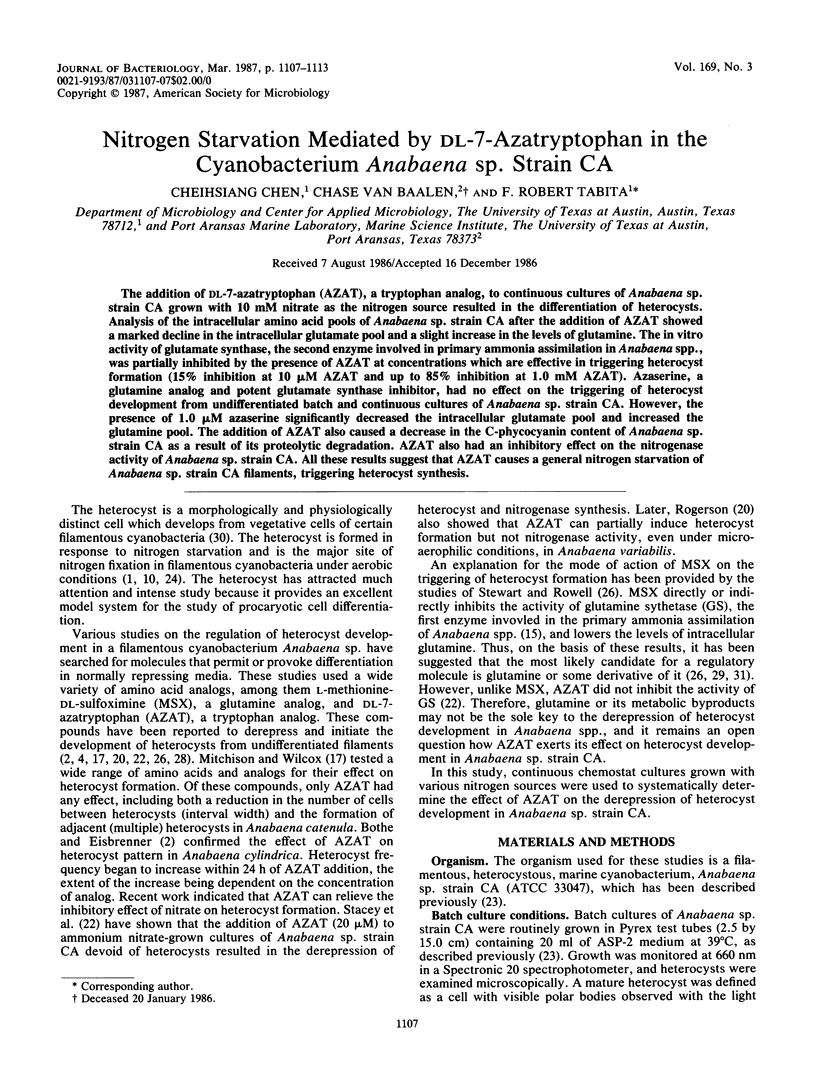
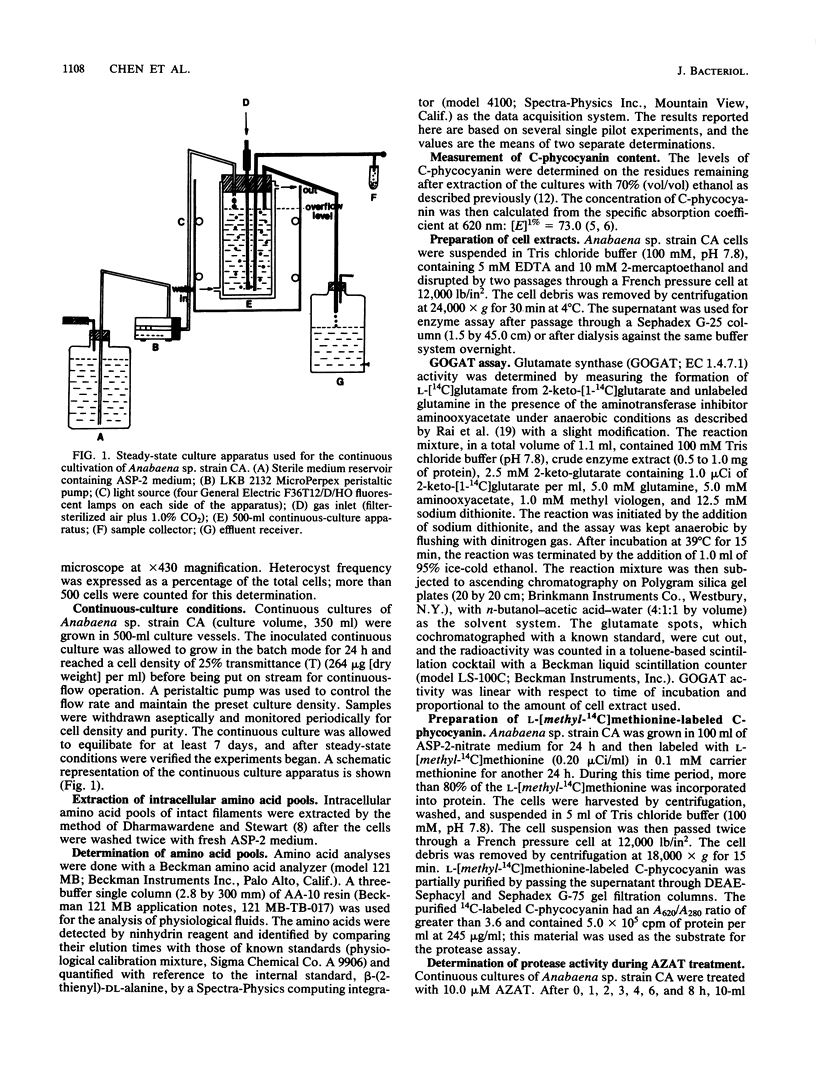
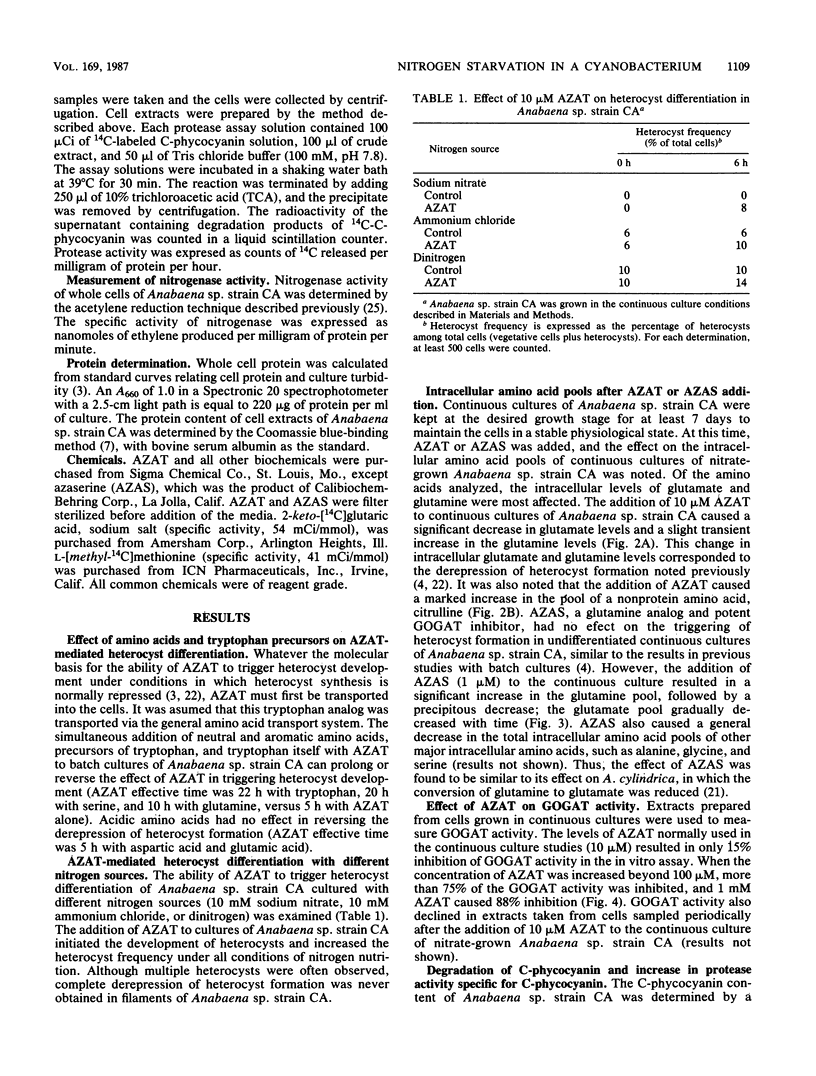
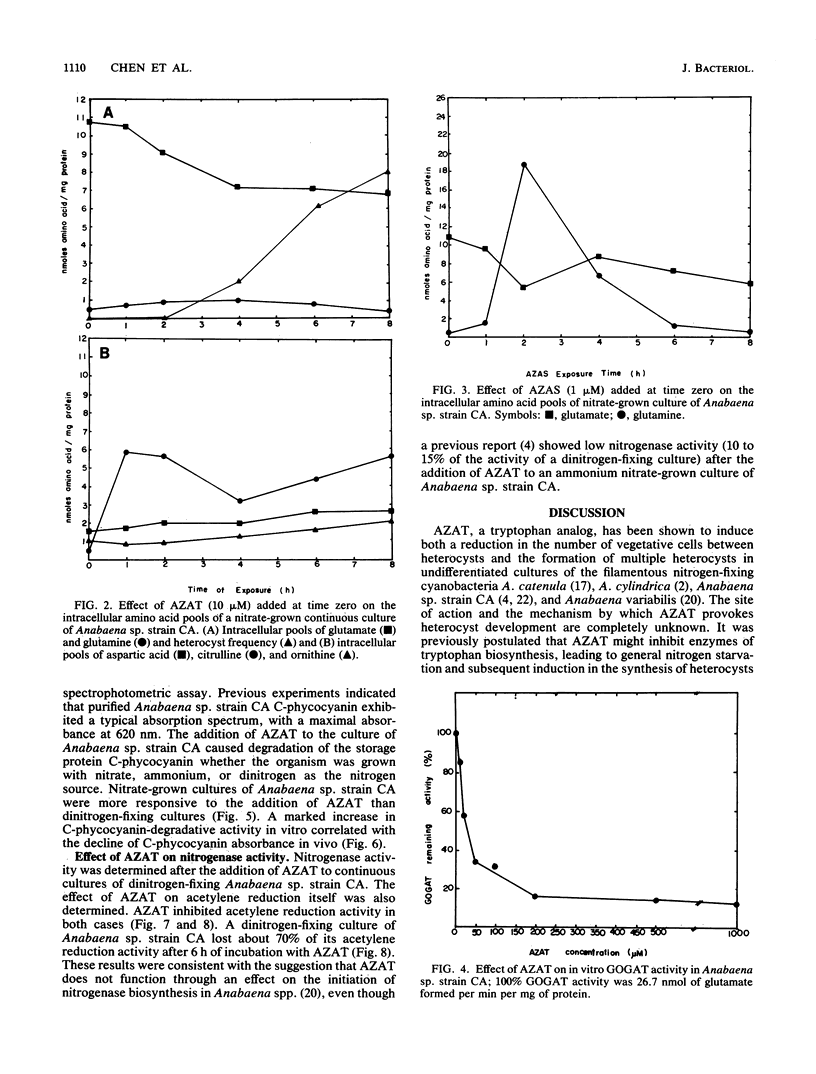
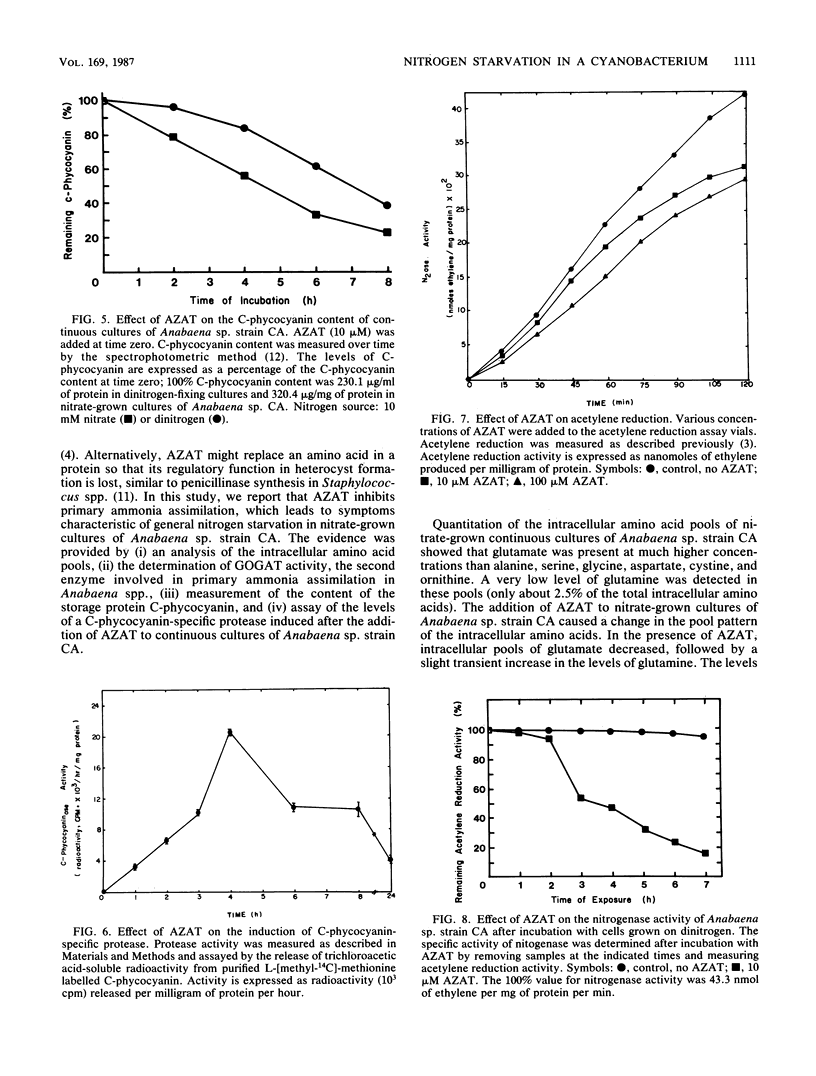
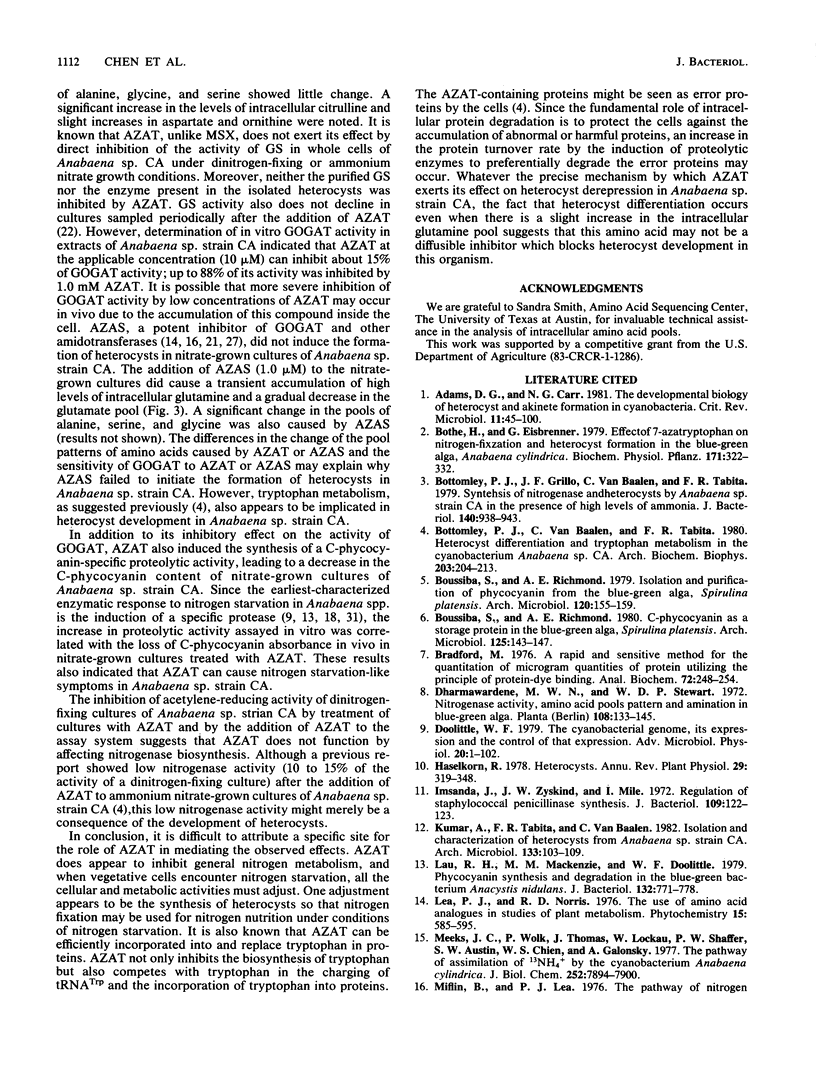
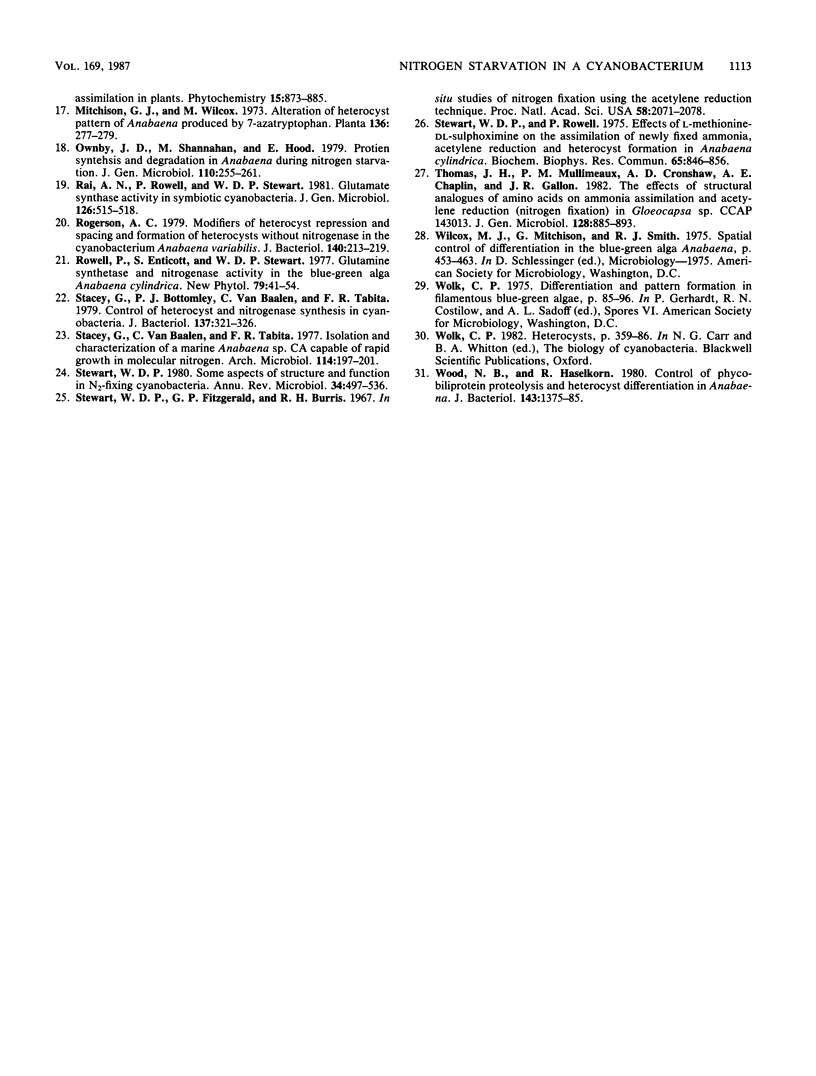
Selected References
These references are in PubMed. This may not be the complete list of references from this article.
- Adams D. G., Carr N. G. The developmental biology of heterocyst and akinete formation in cyanobacteria. Crit Rev Microbiol. 1981;9(1):45–100. doi: 10.3109/10408418109104486. [DOI] [PubMed] [Google Scholar]
- Bottomley P. J., Grillo J. F., Van Baalen C., Tabita F. R. Synthesis of nitrogenase and heterocysts by Anabaena sp. CA in the presence of high levels of ammonia. J Bacteriol. 1979 Dec;140(3):938–943. doi: 10.1128/jb.140.3.938-943.1979. [DOI] [PMC free article] [PubMed] [Google Scholar]
- Bottomley P. J., Van Baalen C., Tabita F. R. Heterocyst differentiation and tryptophan metabolism in the chanobacterium Anabaena sp. CA. Arch Biochem Biophys. 1980 Aug;203(1):204–213. doi: 10.1016/0003-9861(80)90170-8. [DOI] [PubMed] [Google Scholar]
- Bradford M. M. A rapid and sensitive method for the quantitation of microgram quantities of protein utilizing the principle of protein-dye binding. Anal Biochem. 1976 May 7;72:248–254. doi: 10.1006/abio.1976.9999. [DOI] [PubMed] [Google Scholar]
- Doolittle W. F. The cyanobacterial genome, its expression, and the control of that expression. Adv Microb Physiol. 1979;20:1–102. doi: 10.1016/s0065-2911(08)60206-4. [DOI] [PubMed] [Google Scholar]
- Lau R. H., MacKenzie M. M., Doolittle W. F. Phycocyanin synthesis and degradation in the blue-green bacterium Anacystis nidulans. J Bacteriol. 1977 Dec;132(3):771–778. doi: 10.1128/jb.132.3.771-778.1977. [DOI] [PMC free article] [PubMed] [Google Scholar]
- Meeks J. C., Wolk C. P., Thomas J., Lockau W., Shaffer P. W., Austin S. M., Chien W. S., Galonsky A. The pathways of assimilation of 13NH4+ by the cyanobacterium, Anabaena cylindrica. J Biol Chem. 1977 Nov 10;252(21):7894–7900. [PubMed] [Google Scholar]
- Rogerson A. C. Modifiers of heterocyst repression and spacing and formation of heterocysts without nitrogenase in the cyanobacterium Anabaena variabilis. J Bacteriol. 1979 Oct;140(1):213–219. doi: 10.1128/jb.140.1.213-219.1979. [DOI] [PMC free article] [PubMed] [Google Scholar]
- Stacey G., Bottomley P. J., Van Baalen C., Tabita F. R. Control of heterocyst and nitrogenase synthesis in cyanobacteria. J Bacteriol. 1979 Jan;137(1):321–326. doi: 10.1128/jb.137.1.321-326.1979. [DOI] [PMC free article] [PubMed] [Google Scholar]
- Stewart W. D., Fitzgerald G. P., Burris R. H. In situ studies on N2 fixation using the acetylene reduction technique. Proc Natl Acad Sci U S A. 1967 Nov;58(5):2071–2078. doi: 10.1073/pnas.58.5.2071. [DOI] [PMC free article] [PubMed] [Google Scholar]
- Stewart W. D., Rowell P. Effects of L-methionine-DL-sulphoximine on the assimilation of newly fixed NH3, acetylene reduction and heterocyst production in Anabaena cylindrica. Biochem Biophys Res Commun. 1975 Aug 4;65(3):846–856. doi: 10.1016/s0006-291x(75)80463-3. [DOI] [PubMed] [Google Scholar]
- Stewart W. D. Some aspects of structure and function in N2-fixing cyanobacteria. Annu Rev Microbiol. 1980;34:497–536. doi: 10.1146/annurev.mi.34.100180.002433. [DOI] [PubMed] [Google Scholar]
- Wood N. B., Haselkorn R. Control of phycobiliprotein proteolysis and heterocyst differentiation in Anabaena. J Bacteriol. 1980 Mar;141(3):1375–1385. doi: 10.1128/jb.141.3.1375-1385.1980. [DOI] [PMC free article] [PubMed] [Google Scholar]


